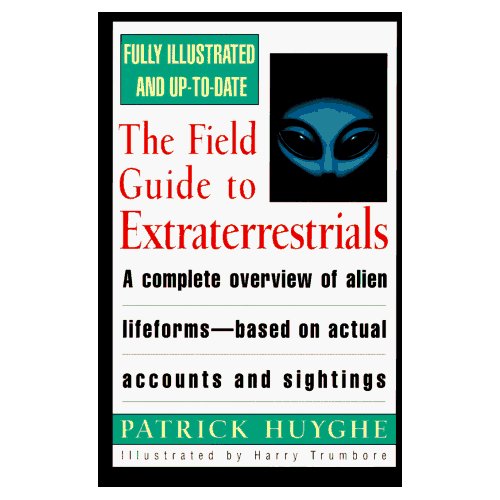

|
|
||||
Books, CDs, DVDs, Documentaries, and Movie ReviewsThe Field Guide to Extraterrestrials by Patrick Huyghe
A pictorial overview of Alien
lifeforms based on actual sightings and reports is compiled in
this unusual historical collection from the late 1800’s to
the present. Opening with a tongue-in-cheek poke at the plethora
of National Audubon Field Guides to flora and fauna, Science
writer Patrick Huyghe gathers unusual reports of Alien encounters
worldwide for his field guide to extraterrestrials. Fifty very
different Aliens are skillfully portrayed in black and white
sketches by illustrator Harry Trumbore. Author Huyghe discusses
ambiguities with current classification systems for Aliens which
fail to cover variations within groups, such as nonhumanoids.
Huyghe objects to systems disregarding highly unusual lifeforms
as isolated cases, and instead, devises a system to encompass
most anomalies reported. Huyghe resolves this dilemma by
dividing Aliens into four primary classifications: Humanoid,
Animalian, Robotic, and Exotic. Within these classifications he
develops separate types, and under that, variants. Humanoids include humanlike
beings or Nordics, short grays, short non-grays, giants, and a
nonclassic catchall group containing a solid black form,
mummylike creatures, as well as a handless being. These creatures
are placed with humanoids because they exhibit the same basic
body structure as a human. Animalian classes may be hairy,
scaly, move on four legs, or have wings. Animalians include hairy
mammalian, reptilian, amphibian, insectoid, and avian. Robotic creatures have a
characteristic mechanical nature to their movements. Robotic
Aliens include metallic types looking like tin cans or slabs of
metal. Fleshy Robotic types have android characteristics of
either humans or animals, such as humanlike arms or legs or scaly
skin of a reptile. Exotic entities represent a
catchall group of Aliens which would not be considered humanoid,
Animalian, or Robotic. Exotic Aliens include apparitional or
physical types. Apparitional types include ghostlike images or
nonhumanoid creatures that are only partially formed or appear to
exist in another dimension. The physical type is a being in the
shape of a blob.
The Field Guide to Extraterrestrial Huyghe covers 50 different Alien
lifeforms, none of which are the familiar gray beings with almond
eyes. Because descriptions of Aliens vary so greatly, Huyghe
challenges skeptics who attribute these apparent differences to
creative imagination. Huyghe argues these differences are to be
expected given the variation of animal and human life on Earth. Cases sited in the book were
chosen for their variations in lifeforms as well as circumstances
reported by witnesses. Date, time and place were also factors
enabling bizarre cases worldwide to be included in the field
guide, including credible older cases. Each case selected for the guide
contains a one or two page narrative describing the observation,
abduction, or missing time experienced by witnesses. Date,
location, and names of witnesses are included in most instances.
Drawings of Aliens are large enough to see clearly and are listed
according to height, from 3 inches to nearly 15 feet in stature. Readers may identify with or
recognize some of the drawings from past experiences or recall
reading similar descriptions from other publicized reports. The
book lends interesting insight into the diversity of life taking
shape in other forms, many of which are reminiscent of creatures
from early Star Trek episodes. The book provides a nice historical overview of aliens past and present,
and offers more pictures to look at than other alien abduction books.
To order the book, click on the bookcover above.
|
Alien Abduction Experience and Research
Copyright ©1996 - 2019. All Rights Reserved.
